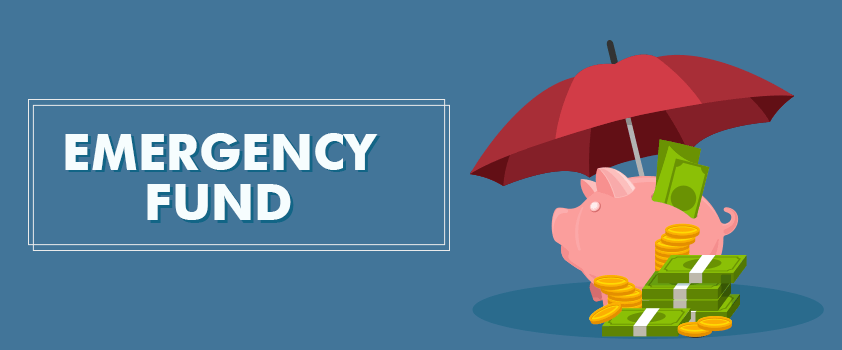Having an emergency fund is like having a must-have tool in your financial toolbox. Imagine it as a cushion for the unexpected bumps in life – it’s there to prevent you from piling on more debt, which you probably already have.
The whole COVID-19 situation has really shown how crucial having an emergency fund can be when a big crisis comes knocking on your door.
We tried to put together this article to navigate you through emergency fund planning and what else you need to know about it.
What is an Emergency Fund?

An emergency fund is like your money safety net, set aside specifically for those surprise expenses life throws at you. It’s your financial cushion, there to catch you when unexpected things happen, like sudden medical bills, unexpected car troubles, or losing your job.
Think of it as your financial superhero, ready to swoop in and rescue you from tough situations. Life is full of twists and turns, and having an emergency fund is like having a superhero sidekick that helps you handle those unexpected financial challenges.
Imagine this fund as your peace-of-mind piggy bank. It’s there to keep you from stressing out when the unexpected hits, ensuring you can manage important costs even when times get tough.
Without this financial superhero, you might find yourself facing debt or even bankruptcy, leading to serious long-term money troubles. So, having your trusty emergency fund is like having a reliable friend in your corner, ready to support you through thick and thin.
A Step-by-Step Guide to Building a Robust Emergency Fund
Building a strong financial safety net is very important. And starting to save money can be tackled in various ways, especially if you’re not rolling in cash or your income varies.
If saving is a bit challenging, you might find managing your spending or putting aside a part of your tax refund the simplest way to kick off your savings journey. The below mentioned emergency saving strategies will help you build your fund very smoothly.
Strategy 01: Make a Habit of Saving Money
Picture building a savings habit like creating a routine for yourself. It’s like planting seeds and watching them grow. If saving money isn’t part of your routine yet, consider these friendly tips to make it stick:
Set a Goal:
Having a clear savings goal keeps you motivated. Your emergency fund can be that goal to aim for, especially when starting out. Use a tool to figure out how long it might take to reach your goal based on what you can afford to save regularly.
Consistent Contributions:
There are many ways to save, but setting up automatic transfers is often the easiest. You could also set aside a fixed amount each day, week, or payday. Making it a routine helps, and if you can occasionally save a bit more, you’ll see your savings grow faster.
Check Your Progress:
Keep tabs on your savings. Whether you get notifications about your account balance or jot down how much you’ve saved, watching your progress can be encouraging.
Celebrate Wins:
If you’re sticking to your savings plan, take a moment to pat yourself on the back. Treat yourself a little, and if you hit your goal, start thinking about the next one.
This strategy is perfect for Anyone, especially those with a steady income. If you know you get paid regularly, turning saving into a habit can be a game-changer.
Strategy 02: Cash Flow Management
Think of your cash flow as the rhythm of your money – when it comes in (your income) and goes out (expenses). If the timing is off, you might run low on funds by the end of the week or month. But by keeping an eye on it, you can find opportunities to tweak your spending and saving.
Timing Adjustments:
You can work with your landlord, utility companies, or credit card companies to change your bill due dates. And when you have more money available, you can sneak a bit extra into your savings.
This strategy is perfect for everyone! Whether you’re living paycheck to paycheck or occasionally splurge, managing your cash flow is a smart money move.
One-Time Savings Opportunities:
There are moments in the year when you might get a financial boost. A tax refund or a cash gift during holidays or birthdays could be your chance to turbocharge your emergency fund.
This is perfect for anyone, especially those with irregular income. If you get a sizeable check, like a tax refund, consider stashing some of it away for a rainy day.
Strategy 03: Automatic Savings
Saving on autopilot is like putting your savings on cruise control, making it grow steadily over time. Setting up automatic transfers between your checking and savings accounts is a simple way to make this happen.
Mindful Balances:
Keep an eye on your account balances to avoid overdraft fees. Setting up notifications or reminders can help you stay on top of things.
This strategy is perfect for anyone, especially those with a regular income. Adjust the transfer amount if your situation changes.
Work-Based Savings:
Your job can be a secret ally in your savings mission. Alongside retirement contributions, check if you can split your paycheck between your checking and savings accounts. This way, you save without even thinking about it.
This strategy is perfect for those with a steady income. If your employer allows it, make your paycheck work for you by automatically putting a chunk into savings.
Remember, building your savings is like growing a tree – it takes time, but with the right care, it’ll provide shade when you need it most.
Why Do You Need Financial Resilience?
Living from day to day can be thrilling and freeing. But it is still a very wise decision to have an emergency fund. And this is why Having an Emergency Fund is Super Important:
Guarding Against Life’s Surprises:
Life is like a rollercoaster, full of twists and turns. Unexpected things can happen, like a sudden medical bill, a car deciding to act up, or finding yourself without a job out of the blue.
But fear not! If you’ve got a well-stocked emergency fund, you’re like a financial superhero ready to tackle these challenges without throwing your big money dreams off track.
Easing Money Worries:
Let’s be real, stress about money can mess with your head and body. It’s like carrying a heavy backpack of worries around all the time. But guess what? Your emergency fund is like a comfy pillow for your finances.
It’s there to give you peace of mind and dial down the anxiety that comes with not knowing what the future holds. Knowing you’ve got a money cushion lets you face tough times with superhero-level strength.
How to Navigate Unexpected Expenses Without Compromising Financial Stability?
Dealing with surprise expenses can throw off your monthly budget and create a chain of money troubles. This can lead to accumulating debt and even mess with your good credit score. Unpaid bills and financial backlogs can make these issues worse.
But hey, there are some smart moves you can make:
Start Saving Smart:
Build a superhero fund (aka an emergency fund) by putting aside a chunk of your money regularly. It’s like creating a money safety net for when life throws you a curveball. It’s a cool way to stay calm and financially stable during unexpected situations.
Consider Short-Term Loans:
If things get tight, you can check out short-term loans from online lenders or regular banks. Just be a savvy shopper and compare interest rates and terms to find the best deal for you.
Cut Down on Unnecessary Spending:
Be a money detective and find places to cut down on spending. Give more love to essential payments and use the extra cash to tackle your financial challenges head-on.
Check Your Money Situation:
Take a close look at your money stuff. Figure out how much you can throw at unexpected expenses without throwing off your other money goals. Also, think about how paying off debts fits into your big financial plan.
Tap into Home Sweet Home:
If you own a place, using your home equity can be a nifty option. It’s like borrowing with a homey touch and often comes with friendlier interest rates. Home equity loans can give you the cash you need with terms that make you smile.
Keep an Eye on Your Credit Score:
Your credit score is like your financial superhero cape. It decides if you can borrow money and at what cost. So, keep it in superhero shape by being awesome with your credit. It’ll really help you out when you need to lean on credit options during unexpected money twists.
Also Read: Alternative Investments for High-Net-Worth Individuals
Bottom Line
Even if you usually keep a good amount of money in your regular checking account or own a credit card with a high minimum balance, having a special fund just for emergencies is still a smart move.
This fund should be different from your everyday spending money to make sure it’s ready to help when you really need it. Relying on loans or credit cards to cover unexpected expenses can lead to a tough financial situation that’s tricky to get out of.
If you had to use your emergency fund in the past few years or never had one to begin with, it’s a good idea to make it a priority to start saving for emergencies now. Having that safety net can make a big difference when life throws you a curveball.

